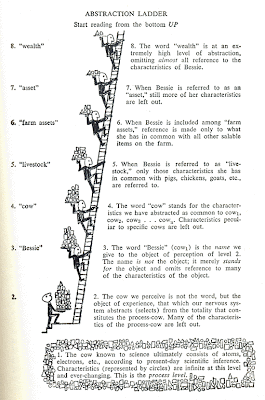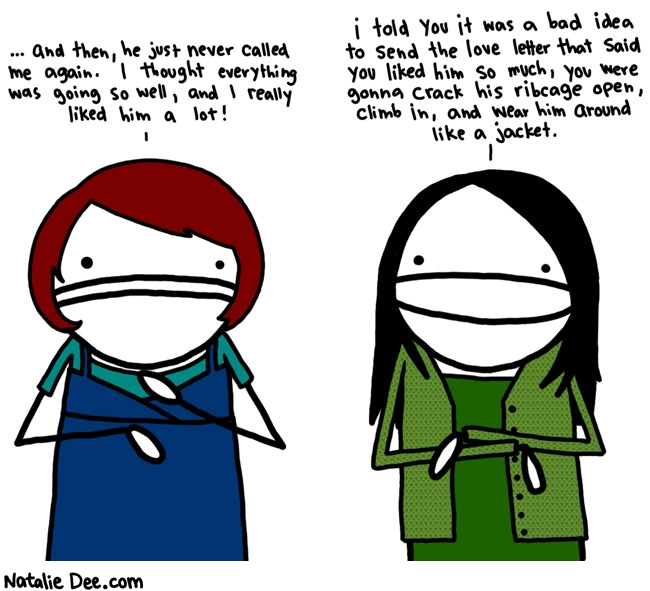
Wednesday, February 25, 2009
Monday, February 23, 2009
Sunday, February 22, 2009
Monday, February 16, 2009
Consumption
"No one escapes from their own culture. It’s hardwired in us, from birth onward. A consumer society is a consumer society. It may start with washing machines and air-conditioning, but sooner or later we consume each other." -John Burdett
I was searching for this quote (which I had in print, but was too lazy to retype), but came across it plagiarized on a blog. I search for quotes a lot, but have never come across one used as if it was a bloggers own words. Interesting. Plagiarizing that literal seems a wee bit silly in the age of Google.
I was searching for this quote (which I had in print, but was too lazy to retype), but came across it plagiarized on a blog. I search for quotes a lot, but have never come across one used as if it was a bloggers own words. Interesting. Plagiarizing that literal seems a wee bit silly in the age of Google.
Saturday, February 14, 2009
Wednesday, February 11, 2009
Viggo V Violence
 TIME Magazine does a 10 questions column with random people. A few months back they had one with Viggo Mortensen, and it touched on a subject I've been pondering heavily lately:
TIME Magazine does a 10 questions column with random people. A few months back they had one with Viggo Mortensen, and it touched on a subject I've been pondering heavily lately:Q. Many of your films deal with a significant amount of brutality. What's it like to explore violent characters? Frank Pennisi, BAYSIDE, N.Y.
A: A lot of time the violence expressed onscreen is a metaphor for what's going on inside. I take it seriously, and I respect directors who depict it responsibly. There are a lot of directors who make too much of a joke about it. That lets the audience off the hook.
 It's been clear to me for a long time now that most physical violence in our movies is not intended to correlate to actual physical violence in our lives. So, it a metaphor. But a metaphor for what? "What's going on inside" feels a bit vague. Last night JT and I caught a T2 revival at the Cinerama, and I was struck by the heavy-handed and conscious use of feminist and pacifist rhetoric in the dialogue. But I don't believe that the movie is really about either. It doesn't even feel like the film makers are consciously aware of what they're talking about. When the two terminators are throwing one another through walls with blank expressions on their faces, what's being engaged inside us? The endless footage of vehicles and building exploding and being demolished feel quickening and cathartic and hedonistic in our action films. But what is it a metaphor for in our internal landscapes? Is it just Nietzsche's Ubermensch: an unfeeling, unstoppable superman? What is it that we want to destory, and what is it that we want to be indestructible?
It's been clear to me for a long time now that most physical violence in our movies is not intended to correlate to actual physical violence in our lives. So, it a metaphor. But a metaphor for what? "What's going on inside" feels a bit vague. Last night JT and I caught a T2 revival at the Cinerama, and I was struck by the heavy-handed and conscious use of feminist and pacifist rhetoric in the dialogue. But I don't believe that the movie is really about either. It doesn't even feel like the film makers are consciously aware of what they're talking about. When the two terminators are throwing one another through walls with blank expressions on their faces, what's being engaged inside us? The endless footage of vehicles and building exploding and being demolished feel quickening and cathartic and hedonistic in our action films. But what is it a metaphor for in our internal landscapes? Is it just Nietzsche's Ubermensch: an unfeeling, unstoppable superman? What is it that we want to destory, and what is it that we want to be indestructible? I got my first comment in a year last week. Any theories about what violence in our films is intended to speak to?
I got my first comment in a year last week. Any theories about what violence in our films is intended to speak to?
Labels:
Nietzsche's Ubermensch,
T2,
Viggo Mortensen,
Violence
Sunday, February 1, 2009
How (Not) to Speak of God, 17 of 23

"Early Christians were called atheists because their own affirmation of God involved a rejection of the gods advocated by the Roman Empire. Yet the atheistic spirit within Christianity delves much deeper than this - for we disbelieve not only in other gods but also in the God we believe in. We... affirm our view of God while at the same time realizing that that view is inadequate... believing in God while remaining dubious concerning what one believes about God." p.25-26
-Peter Rollins, How (Not) to Speak of God
Labels:
How (Not) to Speak of God,
Peter Rollins
Subscribe to:
Comments (Atom)

